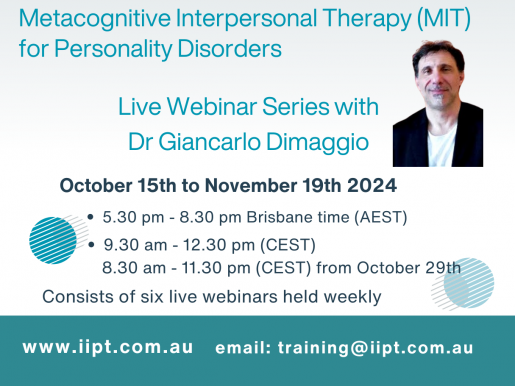Metacognitive Interpersonal Therapy (MIT) Live Webinar Series
$850.00 + GST
For payment plan options with IIP, student discounts, or if you wish to utilise pay later options with your PayPal account, please email [email protected]
Attend six weekly live webinars, totalling 18 hours of professional development.
The cost includes recording of webinars so you can revisit the material later.
Upon completion, you will receive a certificate of attainment.
Date: October 15th to November 19th, 2024
Time: 5:30 pm to 8:30 pm Brisbane time (AEST)
9.30 am - 12.30 pm (CEST)
8.30 am - 11.30 am (CET from October 29th)
Metacognitive Interpersonal Therapy (MIT) is an empirically supported treatment for personality disorders and other severe conditions. It is based on a structured and manualised set of procedures that aim to guide the clinician's therapeutic engagement and treatment from the first session to the conclusion of treatment.
The overarching goal of MIT is to promote metacognitive differentiation or critical distance from maladaptive interpersonal schemas while simultaneously accessing healthy self-aspects, enabling individuals to take control of their actions. These schemas are mostly emotionally charged ideas of self and others with powerful somatic correlates, which trigger suffering and lead to maladaptive behaviours. In order to change these schemas, MIT procedures include various experiential techniques. These techniques are delivered according to a shared formulation, developed in collaboration with the client, fine-tuned, and continuously updated.
Change can occur at two levels: 1) during therapy sessions, where therapists can offer a wide array of experiential techniques such as guided imagery, rescripting, role-play, two-chair work, and sensorimotor exercises; and 2) between sessions, where change is facilitated by continuously focusing on the person’s experiences and challenging habitual patterns through behavioural experiments to achieve their goals.
During this webinar series, we will focus on how to create a truly shared formulation that ensures that therapists and clients are on the same page. We will describe how therapists need to work to negotiate goals and tasks continuously, and clients are consciously and explicitly committing to the next useful therapeutic action. We will explore, in depth, how this collaborative process continuously invites clients to reflect on their own functioning and then decide on the steps they are willing to take to feel better and reach their most relevant life goals.
We will focus on evaluating and reconstructing maladaptive interpersonal schemas. Procedures are described on how to first enrich the repertoire of clients’ autobiographical memories, which are the basis for understanding maladaptive interpersonal schemas. Once a shared formulation is established, the procedures will focus on how to promote change.
This series will also emphasise how to prevent and repair ruptures in the therapeutic relationship and how to meta-communicate. This involves both parties reflecting together on the therapy relationship to improve the client’s self-awareness and to create a safe environment for jointly thinking about the mental states of both people in the relationship.
We will explore the most recent developments in MIT, including procedures that address common therapist pitfalls and offer solutions for overcoming impasses and fostering progress.


